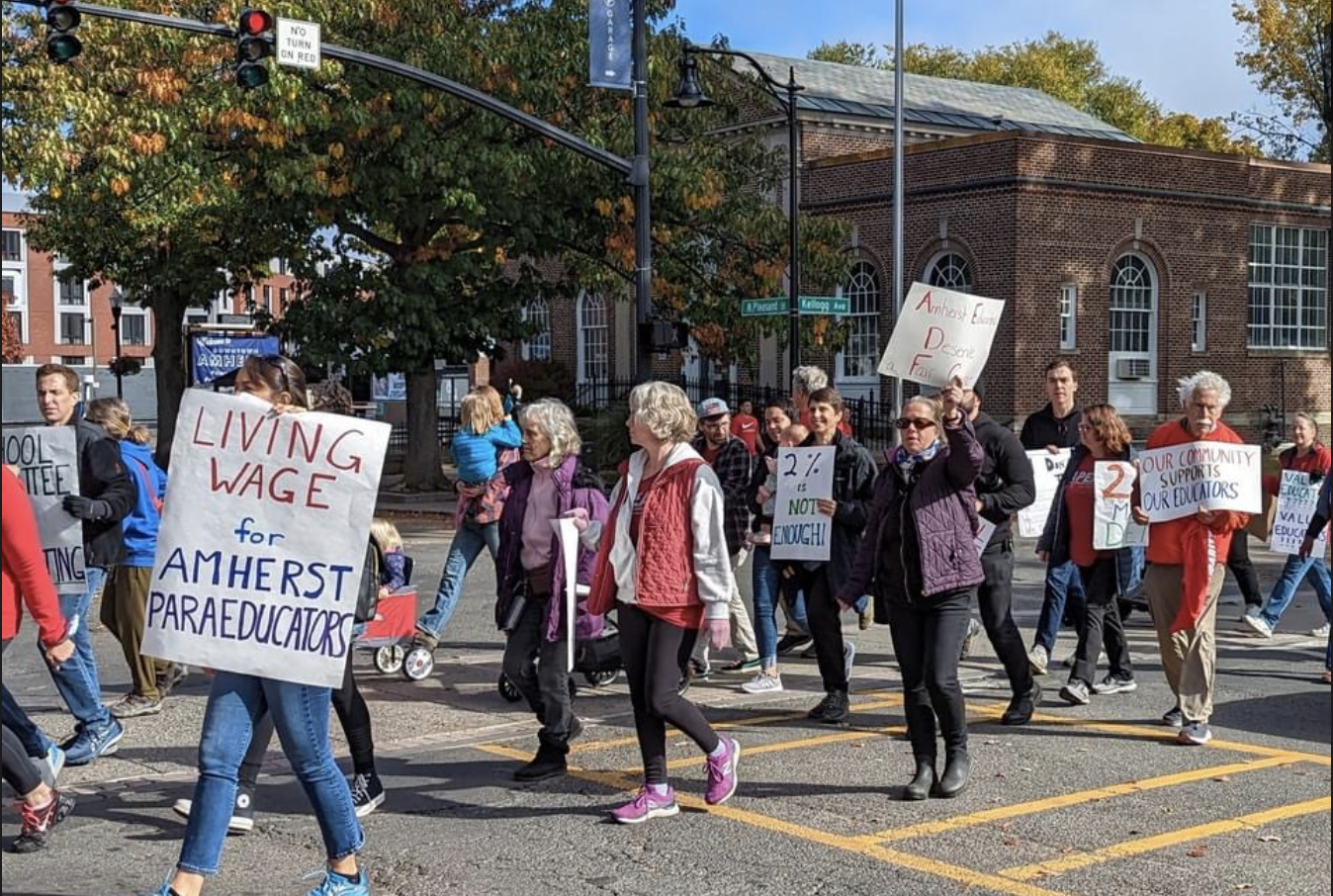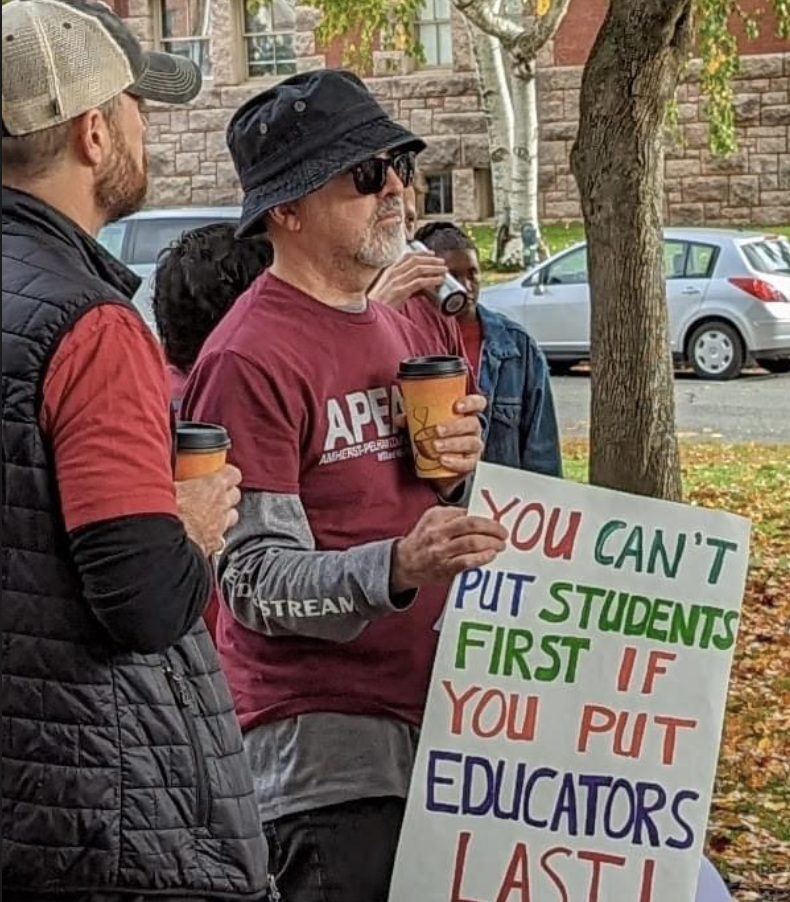ARPS Staff Feel Unappreciated, Stressed, And Fed Up Over Unresolved Contract

Members of the Amherst Pelham Education Association staged a rally on the Town Common in October to demand a fair contract. Photo: The Graphic
The following article appeared previously in The Graphic.
Amherst Regional Public Schools faculty and staff have been negotiating for what they say is “a fair contract” since January of 2022, but they remain at a frustrating impasse with the School Committee.
Most recently, in October of 2022, the Amherst Pelham Education Association (APEA), the union for ARPS employees, lobbied for a 3.25% increase to teacher and clerical staff salaries this year, followed by 4% and 5% increases for the next two years. They asked for a 6% raise for paraeducators to compensate them for what they say is “challenging and necessary work.”
Even increases like these would not keep pace with inflation; the cost of living adjustment (COLA) for 2022 was over 7 percent, and last year, teachers and staff received a meager .6 percent increase. In 2020, they received a 1.5 percent raise.
The teachers’ original demand was a 9 percent increase each year. Amherst School Committee Chair Allison McDonald said the School Committee made three proposals for COLA in response. The first proposal in March of 2022 was for 2% each year for three years. The second in June was for 2.5% for one year followed by 2% for two. The third, in November, was for 2.5% for two years followed by 2% in the third year.
Teachers said they feel like this compensation is not representative of the work they do. “It makes me feel underappreciated,” librarian Ella Stocker said.
According to an APEA press release, “the union estimates that the call for cost of living increases would not exceed 1.2 million in the budget” and that there is “8 million dollars in unencumbered [town funds] that could be used.”
According to McDonald, it’s not that simple. She noted that the APEA contract covers teachers, paras, and clerical staff in three different school districts: the Regional district (ARHS and ARMS), the Amherst district (Amherst’s three elementary schools), and the Pelham district (Pelham elementary school). “While funds from the town of Amherst can be used at the Town Council’s direction for the Amherst elementary district,” she said, “they cannot be directed to Pelham, and cannot be directed to the Region without an agreement (and vote) with the other three towns in the Region to increase the district’s operating budget and potentially increase their funding as well.”
There is strong community support for paying teachers and school staff more. In a letter to the Daily Hampshire Gazette, published on December 13, ARPS parent Laura Pagliarulo wrote that she and her husband moved to Amherst for its public schools and called public schools “the bedrock of democracy.”
“The school committee’s proposal fails to maintain, reward, and attract educators committed to providing a quality public education for our students and their families. Not only this, the committee’s proposal threatens to undermine the educational reputation of Amherst,” she wrote. “The teachers in our district are deserving of a fair and honorable contract.”
According to her, given the fact that inflation is currently at 8.2%, the proposed salary increase of “2.5 % represents an overall decrease in take-home pay by 5.7% which in no way reflects a community that values its teachers.”
According to a 2022 Learning Policy Institute article about teacher pay, “Recent teacher surveys highlight that in addition to the stresses of COVID-19—such as longer working hours, concerns about contracting the virus, and juggling child care responsibilities—teacher salaries also contribute to shortages.”
Teacher retention rates, meaning what percent of teachers return to the school from one year to the next, can also be linked to educator satisfaction with pay. According to the Department of Elementary and Secondary Education, the Amherst teacher retention rate is lower than the local average.
For the district, the retention rate is 77%, compared to 87% for Hadley, 94% for Belchertown, and 82% for Granby. Statewide the retention rate is 86%.
At Amherst Regional Middle School, the retention rate is even lower at 68%, which is in the bottom 10% of the state.
The Learning Policy Institute argues that teachers fleeing the profession “should come as no surprise since U.S. teachers generally earn only about 80% of what other college-educated workers earn on a weekly basis. Indeed, among teachers under 40 who left the profession during the pandemic, the top reason identified for their departure was that the pay was insufficient to merit the risk or stress of the job.”
Social studies teacher Tom Fricke has been on the negotiations committee for three previous contracts, two of which were resolved in regular negotiations, and one which passed in mediation. “There is more unrest and determination than in previous negotiations,” said Fricke of this year’s contract dispute. “People are fed up.”
“Teachers deserve to be paid a living wage,” Stocker said.
Staff members said the stress of the negotiations is taking a toll on the building staff.
One APEA member who wished to remain anonymous pointed to outside factors compounding this stress. “The lockdown on the second day of school, the fires [set in September], losing two students over the span of a few months. It’s been really hard,” the teacher said.
And the stress on the teachers could affect students. “If teachers are overworked or underpaid, students are not getting the best version of that teacher,” Stocker said.
In response to this stalemate, the APEA has demonstrated to bring attention to the issue. On May 12, teachers and paraeducators entered the building together, in what they called a “walk-in” to draw attention to the negotiations. On October 15, a rally was staged on the town common, demanding a fair contract.

Work to rule, where teachers only work for the hours designated in their contract, has been brought up as a possible next move. This drastic measure would mean teachers wouldn’t do any work outside of school, including grading and class prep.
“Nobody really wants to do this; our main priority is the students,” Stocker said. But Fricke, who is also the APEA Union Building Representative, said work to rule might happen “if needed.”
Matthew Owen is a senior at Amherst Regional High School enrolled in Journalistic Writing

It is disappointing that work to rule is considered a “drastic measure.” What is so drastic about teachers refusing to provide unpaid labor? I guarantee that our local police and firefighters are not expected to come in for unpaid overtime so why should teachers?